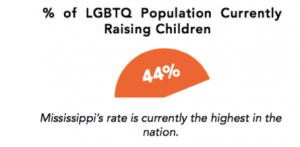
By Madelyn Gelpi, Research Manager
March 19, 2018 — There aren’t many sights along the road from the airport in New Orleans, Louisiana to Jackson, Mississippi. Among those that you do find, besides the evergreen pines or quiet herds of cattle grazing idly in the grass, are signals of the state’s deep religious roots. Hand-painted wooden signs with declarations like “Jesus is the Way” often appear alongside Interstate 55, as do large church buildings planted in the open fields upon the horizon. The capitol building itself in Jackson is flanked on almost all sides by an array of different churches, a subtle metaphor for how deeply engrained these values are in both Mississippi life and politics.
In fact, Mississippi is ranked as the nation’s most religious state, as 59% percent of its residents identify as ‘very religious’. Furthermore, it has maintained this title for over nine years while a majority of residents say that attending services every week is a critical part of life each week. While there were many reasons for Out & Equal’s journey to Mississippi, the true catalyst for our venture was to understand the intersection of this religiosity and its relationship to the LGBTQ community, particularly through HB 1523, which took effect in October 2017
This bill is notorious for being one of the most anti-LGBTQ bills implemented in American society today, as it grants individuals and private organizations the right to deny medical care, including transition-related and mental healthcare, as well as marriage-related goods and services, on the basis of religious beliefs. Furthermore, individuals and private organizations have the right to establish sex-specific dress codes and sex-segregated bathrooms, presenting serious concerns for transgender and gender non-conforming individuals.
This month, Out & Equal held a free Building Bridges training and Town Hall for the community in Jackson, Mississippi. We wanted to meet LGBTQ Mississippians, to understand their struggles, their needs, and their values. We wanted to know how to help, and at the foundation of successfully helping someone exists the process of listening.
The Landscape
 Existing research sheds light on some of the unique challenges faced by the LGBTQ community in Mississippi. High levels of religiosity directly and positively correlate with anti-LGBTQ sentiment, and intersect with a variety of other factors that leave the LGBTQ community in Mississippi particularly vulnerable to the effects of discrimination. 42% of the LGBTQ population averages an annual income below $24,000 per year, while 37% lack health insurance—proportions higher than the general population (21% of non-LGBTQ individuals lack health insurance in Mississippi while 34% average an annual income below $24,000 per year.) Disparities like these have even greater implications for LGBTQ individuals with families or LGBTQ people of color who encounter additional forms of discrimination. This is particularly significant considering the percentage of LGBTQ Mississippians raising children is the highest in the nation, and the percentage of LGBTQ African-American individuals is the second highest rate in the country.
Existing research sheds light on some of the unique challenges faced by the LGBTQ community in Mississippi. High levels of religiosity directly and positively correlate with anti-LGBTQ sentiment, and intersect with a variety of other factors that leave the LGBTQ community in Mississippi particularly vulnerable to the effects of discrimination. 42% of the LGBTQ population averages an annual income below $24,000 per year, while 37% lack health insurance—proportions higher than the general population (21% of non-LGBTQ individuals lack health insurance in Mississippi while 34% average an annual income below $24,000 per year.) Disparities like these have even greater implications for LGBTQ individuals with families or LGBTQ people of color who encounter additional forms of discrimination. This is particularly significant considering the percentage of LGBTQ Mississippians raising children is the highest in the nation, and the percentage of LGBTQ African-American individuals is the second highest rate in the country.
At the intersection of these multiple points of identity and experience—sexual orientation, gender identity, race, parenthood, poverty, high levels of religiosity and anti-LGBTQ sentiment, and lack of sufficient resources—we find the unique and complicated array of challenges faced by LGBTQ Mississippians.
Stories and Struggles
These struggles detailed in research were echoed in our Town Hall discussions. Religion frequently serves as the touchstone for many opponents of LGBTQ equality who use religious beliefs to justify the exclusion and discrimination of LGBTQ individuals.
When asked about the role of religion in anti-LGBTQ sentiment, attendees expressed that religion is used as a defense against LGBTQ equality but isn’t the root of opposition itself. The root, they felt, was fear. Fear of the unknown.
Several attendees described living in “survival mode,” explaining that there are very few resources for LGBTQ individuals in Mississippi. Some mentioned that there are often only “one of each” LGBTQ resource in the whole state—or, in other words, one trans-friendly healthcare provider, one physical LGBTQ center, one trans-specific education organization, the list goes on.
One attendee recounted the difficulties of transitioning in Mississippi, citing that transgender individuals must often travel out of state and pay out-of-pocket for expensive transition-related care.
Furthermore, even advocating for the LGBTQ community can be a very risky venture as many individuals fear losing jobs, family, and friends, or encountering violence. Add to that raising and supporting children. Add to that a likelihood of facing poverty, a lack of healthcare. Add to that HB 1523, which allows providers to refuse mental health services, transition-related care, and additional goods and services to the LGBTQ community.
Yet, here they were advocating. Here they were wanting to make a difference. If there was anything that truly struck me about the LGBTQ community of Mississippi, it is that they are courageous, they are kind, and they are brave.
How Businesses Make a Difference
Most of the attendees both in the training and the Town Hall were employees working at companies with protections in place for LGBTQ individuals. These protections serve as a profound safety net for employees facing otherwise unsupportive circumstances.
The support provided to LGBTQ individuals by their companies through active LGBTQ ERGs, training programs in their workplace, or the addition of sexual orientation and gender identity into anti-discrimination policies made a big difference in countering some of the negative factors faced in the area.
By ensuring that LGBTQ-inclusive policies and initiatives extend to all workers, even those outside of headquarters, businesses have a profound impact on the well-being of their employees, especially in states like Jackson, Mississippi. While only 6% percent of the population in Mississippi is protected from workplace discrimination on the basis of sexual orientation and gender identity, 100% of employees at companies like Toyota and Altria protect their LGBTQ employees through inclusive workplace protections.
During the Town Hall, attendees noted that these protections and support from their companies empower and allow them to feel safer expressing who they are and sharing their story. It became apparent that they had something other LGBTQ individuals in Mississippi didn’t have—they didn’t risk losing their livelihood by being who they are. That seemingly simple element is huge.
The Road to Progress
There is certainly much ground to cover on the road to progress for LGBTQ Mississippians. Yet, in listening to Mississippi voices, we can hear the map of our next steps spreading out before us.
When asking Malaysia Walker, the ACLU of Mississippi’s Transgender Education and Advocacy Coordinator, what she wanted others to know about the importance of fighting for LGBTQ issues in Mississippi, she said, “We can no longer reside in the shadows of society’s myths, miseducation, and controversial depictions of who we are. Help us show the legislators of Mississippi that we are a valuable asset to the growth of our state. Help us show the communities throughout Mississippi that we are their neighbors, co-workers, and friends, and there is no need to be afraid of who we are. The fight for equality cannot be done single handedly. It is going to take all of us fighting to knock down those barricades surrounding us. We are a part of Mississippi and we belong here. Mississippi is our home, too.”
Walker’s words highlight the importance of collective action. Your company can be a part of these efforts and make an incredible difference in Mississippi by:
- Speaking out against harmful policies like HB 1523 and others like it
- Ensuring your Mississippi employees have
- Workplace protections inclusive of sexual orientation, gender identity, and expression
- LGBTQ Employee Resource Groups
- Diversity and Inclusion training to ensure your managers and HR professionals are practicing company values of workplace equality
- LGBTQ-inclusive healthcare, guaranteeing that healthcare providers also share your company’s values
Truthfully, many of us find ourselves on different points on the road toward LGBTQ workplace equality. Different states, different companies, and even different individuals are all somewhere on the spectrum of progress. Maybe somewhere at the beginning, maybe somewhere in the middle, but never at the end—progress is an endless continuum of learning how to be better to our fellow persons.
Here at Out & Equal, we challenge you to walk that road and do your part in advancing that journey of progress in Mississippi and around the world.
For more information on how you can help, contact research manager, Madelyn Gelpi, at mgelpi@outandequal.org
Special thanks to the American Civil Liberties Union of Mississippi and the Transgender Education and Advocacy Program for their support in this initiative.